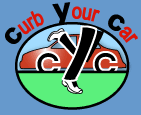| By Michael Smith
Curb You Car Coalition
“Freedom” is a word commonly associated with
automobility. Car manufacturers promote the “liberating”
power of car ownership, teenagers crave the freedom that
comes with having access to a car. The automobile can
indeed be a very useful tool for getting from one place
to another or even from one place to no place in particular—the
escape of being on the road.
Yet the freedom of automobility has significant associated
costs. As the Ithaca community prepares for Curb Your
Car Day on May 21, we should all think about the economic
effects car use has on us as individuals, as families
and as a society.
According to the U.S. Department of Transportation Nationwide
Personal Transportation Survey, the average American family
drives more than 34,000 miles per year, up 40 percent
from 1983. For comparison, the circumference of the planet
is 24,902 miles. And what are the associated monetary
costs of driving all those miles? In 2001 the average
cost per mile traveled was $.50, or roughly $17, 000 per
year for an average family. Of this, gas, oil, tires and
maintenance account for only 20% of the expense. The rest
of the cost comes from so-called fixed costs: insurance,
registration, licensing, finance charges, taxes, purchase
price, and depreciation. This expense is constant; you
pay these costs even when your car is parked in the driveway
or in a parking lot. This is a hefty price to pay for
the “freedom of the road,” even if your particular
costs are lower.
But the visible financial costs to the individual driver
are only part of the story. Polluted ground water, health
problems due to emissions, soil contamination, and other
environmental damage caused by cars are also expensive.
The minimum estimate of automobile-related pollution costs
is $54 million per year. Environmental watchdog groups
have placed the amount as high as $232 million. This is
a price everyone pays, regardless of what kind of car
you drive or whether you drive at all. At $300 billion
per year, the hidden subsidies for automobility in the
form tax-funded infrastructure (roads, bridges, parking
lots, etc.) are also a cost everyone must pay. That’s
an additional $5000 per year for a family of four.
Finally, there are the costs associated with accidents.
In 2001 42,116 Americans died in car accidents. More than
3 million others were injured. The USDOT estimates that
the economic costs due to medical care, lost productivity
and property damage are minimally $230 billion per year.
These estimates, of course, do not include the unquantifiable
costs associated with the grief and suffering that accompany
car accidents.
In sum, the total social costs of our automobile habit
are, by the Federal Highway Administration’s reckoning,
$1.7 trillion to $3.3 trillion annually. Curb Your Car
Day is an opportunity to contemplate our extravagantly
expensive love affair with the automobile and experiment
with alternative ways of getting from one place to another.
If all of us can minimize our car usage, the potential
savings for us as individuals, as families, and as a society
are enormous.
|
